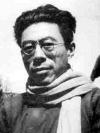Biography
Wen Yiduo (simplified Chinese: ; traditional Chinese: ; pinyin: Wén Yiduo; Wade–Giles: Wen I-to; 24 November 1899–15 July 1946), born Wén Jiahuá, courtesy names Yousan, Youshan, was a Chinese poet and scholar..
Wen was born in Xishui County, Hubei. After receiving a traditional education he went on to continue studying at the Tsinghua University.
In 1922, he traveled to the United States to study fine arts and literature at the Art Institute of Chicago. It was during this time that his first collection of poetry, Hongzhu (紅燭, "Red Candle"), was published.
In 1925, he traveled back to China and took a university teaching post. In 1928, his second collection, Sishui (死水, "Dead Water"), was published. His poetry is influenced by Western models. In the same year he joined theCrescent Moon Society and wrote essays on poetry, mostly stressing that poetry should have "formal properties". He also began to publish the results of his classical Chinese literature research.
At the outbreak of the Second Sino-Japanese War, he and many other intellectuals from northeastern China migrated to Kunming, Yunnan. There he was able to continue to teach, this time in the wartimeNational Southwestern Associated University.
He became politically active in 1944 in support of the China Democratic League. His outspoken nature led to his assassination by secret agents of the Kuomintang, right after eulogizing his friend Li Gongpu's life at Li's funeral in 1946.
A monument to Wen can be found at the Yunnan Normal University campus in Kunming, as can a large statue. A small memorial to him, including a wall portrait painted from a famous picture of him smoking his pipe is found in a walkway by his former home (the site is now part of an elementary school) in the Green Lake area of Kunming. He and his wife, Gao Zhen, are buried at the Babaoshan Revolutionary Cemetery in Beijing.






